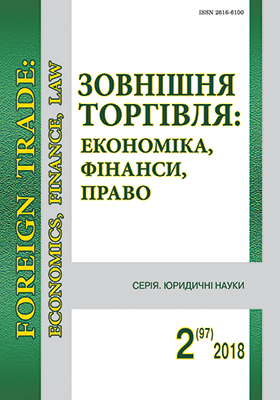«COMPARATIVE CIVIL LAW» IN THE LEGAL EDUCATION SYSTEM
Keywords:
comparative civil law, civil law, trade law, academic discipline, dualism of private lawAbstract
Background. Given the globalization and integration processes taking place in the world, as well as the desire of Ukraine to be a full member of the world community, comparative studies of various institutes existing and operating in foreign countries, their legal regulation and practical experience are applicable. Professional training of lawyers necessarily involves the study of comparative law, as well as other comparative legal disciplines, depending on specialization. The first of which is the academic discipline «Comparative civil law».
Analysis of recent research and publications. The following researchers, such as I. S. Kanzafarova, S. I. Shimon, I. O. Zenin, V. M. Koryakin, A. Saidov, E. Kurzinsky-Singer and O. Shmagin paid attention to the issues of problems of civil and commercial law of foreign countries.
The aim to highlight and summarize existing positions in understanding «Comparative Civil Law» as a discipline, and to fill the vacuum created in the domestic legal science in the context of defining the concept and subject of «comparative civil law».
Materials and methods. Such general scientific and special research methods, as dialectic, system-functional, comparative methods are methodological basis of the study. The database was compiled by Ukrainian and foreign scholars, civil and commercial codes of different countries.
Results. To the subject of comparative civil law can be attributed: property and personal non-property relations, based on legal equality, free expression of will and property independence of their participants; personal non-property and property relations of the spouses, parents and children, adopters and adopted children, other family members and relatives, as well as norms on the conclusion and termination of marriage; trade, entrepreneurial relations, as well as property relations of the entities between which these relations arise, change, operate and cease.
This circle of relations is much wider than the circle of relations, which are included in the subject of regulation of civil law of Ukraine.
Conclusion. Despite the fact that the discipline «Comparative Civil Law» is taught in many universities, it should be noted that there is no relevant educational literature with the same name, only the availability of publications that examine and analyze specific norms or institutes of civil and commercial law of different countries.
The basis for studying students of the discipline «Comparative Civil Law» is definitely the science of civil law, as well as the jurisprudence of the application of civil law. Consequently, comparative civil law, as a discipline, is taught in higher education institutions, introduces students to the norms and institutions of civil law of different countries, and provides an opportunity to analyze the world experience of legal regulation of relations that are the subject of comparative civil law.
References
Kanzafarova I. S. Grazhdanskoe i torgovoe pravo zarubezhnyh stran : Otdel’nye instituty : ucheb. posobie. Har’kov : Odissej, 2003. 351 s.
Shymon S. I. Cyvil’ne ta torgove pravo zarubizhnyh krai’n: navch. posib. : Kurs lekcij. Kyi’v : Vyd-vo KNEU, 2004. 220 s.
Zenin I. A. Grazhdanskoe i torgovoe pravo zarubezhnyh stran : uchebnik dlja bakalavrov. M. : Izd-vo Jurajt, 2013. 282 s.
Korjakin V. M. Grazhdanskoe i torgovoe pravo zarubezhnyh stran v shemah i tablicah : ucheb. posobie. M. : Prospekt, 2016. 112 s.
Sai’dov A. Porivnjal’ne cyvil’ne pravo jak navchal’na dyscyplina. Porivnjal’ne pravoznavstvo. 2013. № 1–2. S. 471–485.
Kurzinski-Singer E. Principy nemeckogo veshhnogo prava i razgranichenie veshhnyh i objazatel’stvennyh prav. Sbornik statej o prave Germanii. 2015. № 1. S. 67–73.
Shmagin A. Predstavitel’stvo v nemeckom prave. Sbornik statej o prave Germanii. 2017. № 2. S. 145–157.
Pravo vlasnosti: jevropejs’kyj dosvid ta ukrai’ns’ki realii’. Visn. Verhovnogo Sudu Ukrai’ny. 2015. № 11. S. 13–16.
Goncharenko O. M. Mizhnarodne pryvatne pravo : navch. posib. Kyi’v : Kyi’v. nac. torg-ekon. un-t, 2015. 392 s.
Mahinchuk V. M. Pryvatnopravove reguljuvannja pidpryjemnyc’kyh vidnosyn v Ukrai’ni. Kyi’v : Jurinkom-Inter, 2013. 320 s.
Otnoshenija, reguliruemye grazhdanskim zakonodatel’stvom. URL : http://base.garant.ru/10164072/741609f9002bd54a24e5c49cb5af953b.
Bezuh O. V. Dualizm pryvatnogo prava v reguljuvanni ekonomichnyh vidnosyn. Pryvatne pravo i pidpryjemnyctvo. 2016. Vyp. 15. S. 10–14.



